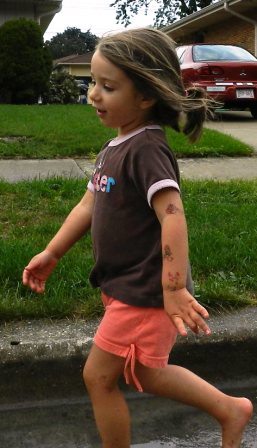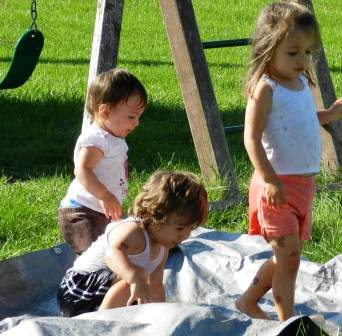Some days in my life with my young children, nothing works as I expect it to. If I have learned anything in my almost four years as a mother, it is that everything changes. Occasionally, I forget this lesson and need to relearn it. What worked yesterday to help a baby fall asleep or to encourage a toddler to clean up doesn’t work today. What made a child so happy this morning can cause anger later in the day. The toy that the child threw aside in the morning now has become his most prized possession after nap. It can be very frustrating, sometimes even maddening! It doesn’t have to be. If you start to think like a child does and internalize that all you have is this present moment and accept that it too can change, the moments that seemed so impossible can start to look doable, dare I say even enjoyable.
Our rhythms at home have been undergoing a transformation, and for the most part, things have been getting better and going smoother. But of course, there are moments, mornings, or sometimes whole days that just seem to have gone awry. The other morning, it took a half hour of encouraging, persuading, and even a bit of (gasp) threatening to have my daughter wash her dish from breakfast. The children started washing their own dishes about a month ago. At first, it was exciting for the children. The table was at the perfect height, they got to dip their hands in warm, bubbly water, and they felt proud to wash their own dishes. For my son, this task has become mostly routine for him. He does it without a whole lot of hoopla. For my youngest daughter who doesn’t quite have the developmental abilities to wash her dish, dipping her hands in the water, splashing, and then wiping her wet hands on the nearest person is quite a thrill! For my eldest, washing dishes has become mundane, some mornings even torture.
In stepping back and observing my eldest child, I realize that she is a child who loves to do something if it is her idea and done in her way. Figuring this out and remembering it are two whole different things! With all kids, it can take encouragement and fun to incorporate the domestic arts into daily life, but with my eldest, it sometimes takes a bit more. Trying to create a game out of the ordinary chore, authentically complimenting her on a job well done, or somehow creating the idea in her head that washing the dishes is a wonderful thing to do, are a few of the techniques I have tried. Some days I have to help her with washing and other times I need to be loving but firm and insist that before we go outside, she must wash her dish.
All this said, it has not become a smooth rhythm for my eldest to wash her dishes. At all meals today, she initially refused to wash her dish. I resorted to the taking away something she loved to try to have her wash her dish, but it failed to work and I was left feeling a bit like a failure. Reflecting on the day now, I remind myself that rhythm isn’t strict. It ebbs and flows. Sometimes the rhythm runs smooth and other times, rough.
 By having my rhythm fail to work as smoothly as I had hoped, I find myself learning valuable lessons. First, I learn once again that the constant in life is that things change. Second, I learn to put my own desires aside and work on my creativity in encouraging my daughter to help with household tasks and work as a family unit. Third, I learn to trust my gut and follow what I have learned through my LifeWays training that incorporating your children in the domestic arts is vital to creating whole children. So tomorrow, I get yet another challenge as a mother. I get to try again to make doing dishes fun, or at the very least, less torturous than it felt the day before!
By having my rhythm fail to work as smoothly as I had hoped, I find myself learning valuable lessons. First, I learn once again that the constant in life is that things change. Second, I learn to put my own desires aside and work on my creativity in encouraging my daughter to help with household tasks and work as a family unit. Third, I learn to trust my gut and follow what I have learned through my LifeWays training that incorporating your children in the domestic arts is vital to creating whole children. So tomorrow, I get yet another challenge as a mother. I get to try again to make doing dishes fun, or at the very least, less torturous than it felt the day before!
Recently, I came across an article that, along with the encouragement of my LifeWays mentor and friend, pushed me and my husband to really start incorporating the children in our daily chores. The article, Involving Children in Household Tasks: Is it Worth the Effort, on research by Marty Rossmann of the University of Minnesota, highlights research that demonstrates children who are involved in household tasks at an early age are taught a sense of responsibility, competence, self-reliance, and self-worth that stays with them throughout their lives. Therefore, since I value research almost equally to the scientifically unproven yet truly precious truths of experienced parents, I now have “proof” that all the hard work it takes to encourage my children to be involved in the daily domestic arts in our home will be worth it someday!
Even with my so-called proof (or research based evidence), I am still left with the task of creating ways to incorporate my children in the daily household tasks without a ton of resistance. How do you bring your children into the daily domestic tasks? Please share any suggestions in the comments below.
Mara Spiropoulos is the blog coordinator and parent voice for the LifeWays North America blog. She is a recent graduate of the LifeWays training program, resides in Milwaukee, WI, and a full-time mother to 3 young children. Mara enjoys spending time in nature, reading and researching natural parenting and living, and crafting. She would love to hear from anyone willing to be a guest writer and you can reach her by email at linearmara@gmail.com.

Doing it Together
Mara, I can sympathize with your struggles! My suggestion with young children–especially with a child who is wants things to be her idea–would be to avoid head-on collisions and avoid trying to force her. See if you can create an atmosphere of everyone working together, rather than coming from the idea that everyone has to take care of his own share (remember the principles of imitation and movement, as in putting toys away–we all put all the toys away and mom actually does a lot of it, otherwise it would be a disaster!).
Here are some possibilities when she’s not coming along (you can think up more):
Imagination and play: “Where’s your spoon hiding? It’s peaking out from under your plate. Now it’s blowing bubbles!! Look!” And then wash it off around her, so it’s done without her having either done it or opposed you.
Side stepping: “I wonder if your brother is big enough to carry TWO plates from the table today? Wow, he is! Thank you.” And then help him get hers done at the same time.
Come up with a new lead-in job: “You can squirt the soap into the tub today. First put your plate in, then I’ll pour the water in, then you can squirt and stir up bubbles.”
Choices: “If you’d rather sit at the table and wait while we play with the soapy water, okay. It won’t take us long.”
There’s always tomorrow: “I know you’ll help us tomorrow.”
Remember, having your little ones develop good habits doesn’t come from making it conscious or by coercing them, but (over time) from being around tasks happening every day in the same way and their being able to help—all things I didn’t say in my comments; I’d make it all much more “groupy” (what if we each only did our own dishes? Life would stall out.) And sing something like “This is the way we wash our dishes” the whole time so it’s less obvious when she’s not participating and you’re less likely to express annoyance. There are so many angles to look at this from—I hope you get a lot more comments.
Thanks for asking the questions! I’m delighted that you’re sharing your journey in the blog world.
I love your comment about
I love your comment about having another opportunity tomorrow to try it again. I need to remind myself a lot that I’m not failing and that each day brings more opportunities to connect in these areas of household tasks, bodily care, and play. My little guy is 2 and I find myself stepping back constantly and asking “what am I expecting from him and is it realistic for right now?” I often find that my expectations revolve around me wanting to get something done right now, the way I want it to be done. He couldn’t care less about that! 🙂 It’s all a learning process, for us and them. My patience has increased greatly, but still has a long way to go…luckily I will have many many more chances to work on it!
Thanks Rahima and Renee
Renee – so very true that we always have another chance to try again. I have 3 young kids very close in age and there are days I feel like a failure, and days I feel like a complete success. Reality is I’m doing the best I can with the resources I have on that given day. Kudos to you for keeping in mind your son’s development.
Rahima – thank you for your words of wisdom. They are so very helpful and a great reminder that I need to keep in mind the goal of including children in the domestic arts rather than the immediate task of getting dishes done!